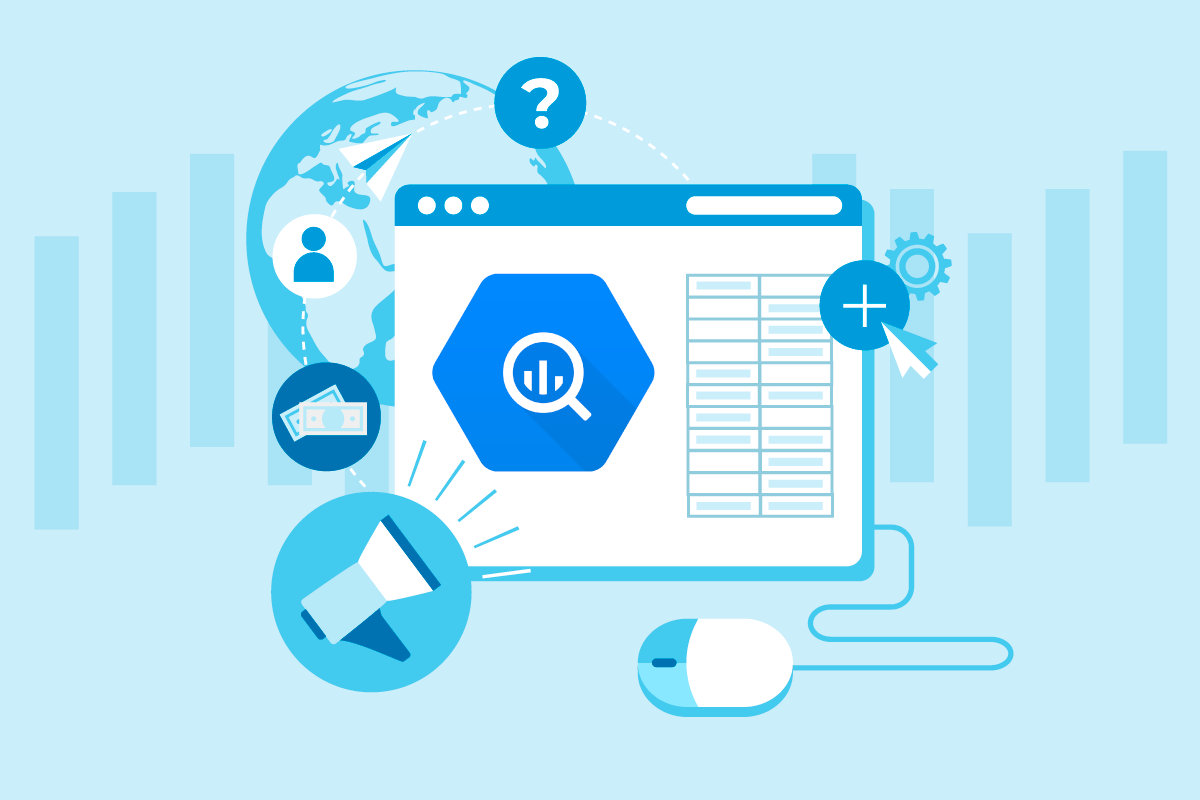Unlocking the immense potential of big data has become a game-changer for businesses across industries. With mountains of information waiting to be harnessed, organizations are constantly seeking innovative strategies to effectively manage and utilize this wealth of data. That’s where Google Cloud Platform (GCP) steps in. As one of the leading cloud computing platforms, GCP offers powerful tools and solutions to create robust data warehouses that can handle the massive scale and complexity of big data. In this blog post, we’ll explore the world of data warehousing strategies on GCP, guiding you through the different types of warehouses available and how to leverage big data techniques effectively. So, fasten your seatbelts as we embark on an exciting journey into the realm of big data and GCP!
What is big data?
What is big data? It’s a term that has been buzzing around for quite some time now, but what does it really mean? In simple terms, big data refers to large volumes of structured and unstructured data that inundates organizations on a daily basis. We’re talking about massive amounts of information coming from various sources such as social media platforms, sensors, machines, and more.
But size alone doesn’t define big data. It’s also about velocity – the speed at which this data is generated and needs to be processed. And let’s not forget variety – the different types of data including text, images, videos, and audio files. Together with volume and velocity, variety forms the three Vs of big data.
So why should businesses care about big data? Well, because hidden within all this vast amount of information are valuable insights that can drive decision-making processes and fuel innovation. By analyzing patterns and trends in big data sets using advanced analytics techniques like machine learning algorithms or natural language processing (NLP), organizations gain a competitive edge by making informed strategic decisions based on real-time insights.
However, handling big data comes with its own set of challenges. Traditional methods of storing and processing structured datasets simply won’t cut it when dealing with the enormous scale and complexity involved in managing big data. That’s where cloud computing platforms like Google Cloud Platform (GCP) come into play.
Stay tuned as we dive deeper into GCP’s capabilities for creating powerful solutions to handle your organization’s ever-expanding pool of big data!
What is Google Cloud Platform?
Google Cloud Platform (GCP) is a comprehensive suite of cloud computing services offered by Google. It provides a wide range of tools and capabilities to help businesses effectively manage and analyze their data. With GCP, organizations can leverage the power of the cloud to store, process, and retrieve massive amounts of information in real-time.
One key feature of GCP is its scalability. Businesses can easily scale up or down their resources based on their specific needs, allowing them to handle large volumes of data without any hassle. Moreover, GCP offers robust security measures to protect sensitive information from unauthorized access or breaches.
Another advantage of using GCP is its integration with other Google services like BigQuery and Dataflow. These tools enable seamless data analysis and processing at scale, making it easier for businesses to gain valuable insights from their big data.
Furthermore, GCP provides various storage options such as Cloud Storage and Cloud SQL that cater to different types of workloads. This flexibility allows businesses to choose the most suitable storage solution based on their specific requirements.
In addition, GCP offers advanced analytics capabilities through tools like Data Studio and AI Platform that empower organizations to extract meaningful patterns and trends from complex datasets.
Google Cloud Platform offers an extensive set of features that make it a powerful choice for building scalable data warehouses and implementing big data strategies. By leveraging the capabilities provided by GCP, businesses can unlock the full potential of their big data assets while ensuring high performance, security, and flexibility in managing their data infrastructure.
What are the different types of data warehouses?
Data warehouses are essential for organizing and analyzing large amounts of data. They serve as a central repository where various types of data can be stored, processed, and accessed. When it comes to data warehousing, there are different approaches that can be taken based on the specific needs of your business.
One type of data warehouse is the traditional or on-premises model. This involves setting up hardware and software infrastructure within your own organization’s premises to store and manage your data. While this approach provides complete control over your data, it can be expensive to set up and maintain.
Another option is cloud-based data warehousing, which has become increasingly popular in recent years. With cloud-based solutions such as Google Cloud Platform (GCP), you can leverage the scalability and flexibility offered by the cloud to easily store and analyze large volumes of data.
GCP offers two main types of cloud-based data warehousing services: BigQuery and Cloud Spanner. BigQuery is a fully managed serverless analytics platform that allows you to run SQL queries on massive datasets quickly. It automatically scales resources based on demand, making it ideal for handling big data workloads.
On the other hand, Cloud Spanner is a globally distributed relational database service that combines the benefits of traditional databases with horizontal scalability across multiple regions. It provides strong consistency guarantees while allowing you to scale horizontally without compromising performance.
In addition to these options provided by GCP, there are also other specialized tools available for specific use cases such as real-time streaming analytics or machine learning integration within your data warehouse architecture.
Choosing the right type of data warehouse depends on factors such as cost considerations, scalability requirements, security concerns, and analytical capabilities needed for your business operations. By leveraging GCP’s offerings like BigQuery or Cloud Spanner along with other complementary tools from its ecosystem partners, you can build a robust and efficient solution tailored to meet your big-data needs.
How do you create a data warehouse on GCP?
Creating a data warehouse on Google Cloud Platform (GCP) is easier than you might think. GCP offers various tools and services that can help you build a robust and scalable data warehousing solution.
To start, you will need to choose the right tool for your needs. GCP provides two primary options: BigQuery and Cloud SQL Data Warehouse. BigQuery is a fully-managed, serverless data warehouse that allows you to run fast queries on large datasets. On the other hand, Cloud SQL Data Warehouse offers more control over your infrastructure but requires more management effort.
Once you have chosen your tool, the next step is to design your schema. Also, you will have to define how your data will be structured in the warehouse. This involves creating tables and defining relationships between them.
After setting up the schema, it’s time to load your data into the warehouse. You can use several methods to ingest data into GCP. It includes streaming data in real-time or batch loading from external sources like Google Cloud Storage or Google Sheets.
When all of your data is loaded into the warehouse, you can start running queries and analyzing it using powerful analytics tools provided by GCP. These tools allow you to gain insights from your big data quickly and efficiently.
Creating a data warehouse on GCP involves choosing the right tool for your needs. It also involves designing an appropriate schema, loading the relevant datasets, and utilizing powerful analytics tools provided by GCP. With these steps in mind, you’ll be well on your way to building an effective big data strategy with Google Cloud Platform.
How do you use big data strategies with GCP?
Big data has become a game-changer in today’s digital world. It offers unprecedented opportunities for businesses to gain valuable insights and make informed decisions. However, harnessing the power of big data requires robust strategies and cutting-edge technologies. That’s where Google Cloud Platform (GCP) comes into play.
With GCP, you can leverage various big data strategies to unlock the true potential of your data. One such strategy is using Google BigQuery, a fully-managed serverless data warehouse. It enables you to analyze massive datasets quickly and efficiently. By utilizing BigQuery’s scalable infrastructure and advanced querying capabilities, you can uncover hidden patterns, derive meaningful insights, and drive actionable outcomes.
Additionally, GCP offers Dataflow – a powerful tool for processing large-scale streaming or batch data sets effortlessly. With Dataflow’s flexible programming model based on Apache Beam technology, you can process vast amounts of real-time or historical data. Also, you can ensure fault tolerance and scalability.
Another essential aspect of using big data strategies with GCP is leveraging machine learning capabilities through tools. These tools include TensorFlow or AutoML. By applying machine learning algorithms to your big datasets stored on GCP, you can train models that make accurate predictions and automate decision-making processes.
Furthermore, GCP provides integration with other popular big data tools. It includes Apache Hadoop ecosystem components (e.g., Hive), Apache Spark for distributed computing tasks at scale (e.g., ETL operations), and Cloud Data Fusion for building sophisticated pipelines that streamline the movement of diverse datasets across different systems.
Conclusion
In this era of big data, businesses need effective strategies to manage and analyze their vast amounts of information. Google Cloud Platform (GCP) provides powerful tools and services for creating efficient data warehouses.
By understanding what big data is and how it can benefit your organization, you can make informed decisions. You can take the best approach for managing and analyzing your data. GCP offers a range of solutions, including BigQuery, Cloud Spanner, and Cloud Dataflow. These solutions cater to different types of data warehousing requirements.
When creating a data warehouse on GCP, consider factors such as scalability, flexibility, security, and cost-effectiveness. Through careful planning and leveraging the capabilities provided by GCP’s managed services, you can design a robust infrastructure that meets your specific needs.
To maximize the benefits of utilizing big data strategies with GCP, ensure that you have clear goals in mind. Define key performance indicators (KPIs) that align with your business objectives so that you can measure success effectively.
Remember to incorporate machine learning techniques into your analysis process to uncover valuable insights hidden within your data. GCP’s integration with TensorFlow allows for advanced analytics tasks such as predictive modeling or anomaly detection.
As technology continues to evolve rapidly in the world of big data analytics, staying up-to-date with industry trends is crucial. Regularly explore new features introduced by GCP to take advantage of cutting-edge tools. It will enhance efficiency and drive innovation within your organization.
In conclusion, harnessing the power of big data through effective data warehousing strategies on Google Cloud Platform empowers businesses. They can gain deeper insights into their operations while making more informed decisions based on accurate information. With its comprehensive suite of tools and services designed specifically for handling large datasets efficiently at scale,





